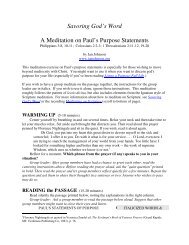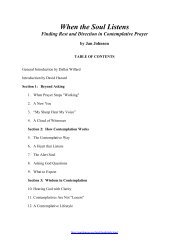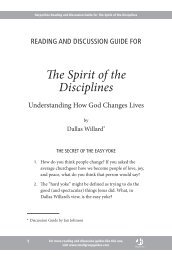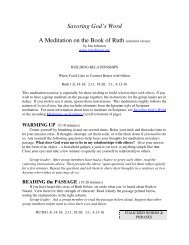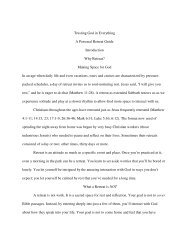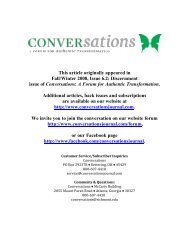FREE Download - Jan Johnson
FREE Download - Jan Johnson
FREE Download - Jan Johnson
Create successful ePaper yourself
Turn your PDF publications into a flip-book with our unique Google optimized e-Paper software.
family is free of sinful tendencies? As people search their souls, the Spirit reveals what they<br />
need to know. It's important to be open to God to reveal the issues He wants disclosed.<br />
Blaming parents is futile because most parents are well meaning in their attempts to nurture<br />
children. Parents were affected by their own sin nature, culture and upbringing. Many parents<br />
have made heroic attempts to filter out these influences and they have passed on much less of the<br />
denial, blame, isolation and anger. As a result, our struggle is not as severe as it might have been.<br />
Q AREN'T WE SUPPOSED TO FORGET WHAT LIES BEHIND AND STRAIN TOWARD<br />
WHAT LIES AHEAD (Phil. 3:13)?<br />
A This passage is not talking about burying past hurts, but about how Paul put his glorious past<br />
as an elite Hebrew leader behind him and learned to be a humble disciple. He even dared to<br />
become an outcast in religious politics -- you might say he was no longer interested in being a<br />
"looking-good kid."<br />
Denying that someone hurt us is not the same as forgiving a hurt, although many prefer to<br />
substitute denial for forgiveness. To forgive someone, we must know the offense. Forgiveness<br />
is part of the healing process, described by the prophet Jeremiah: "You can't heal a wound by<br />
saying it's not there!" (Jer. 6:14, LB).<br />
Q WHEN IS ANGER APPROPRIATE?<br />
A The sin is not anger, but bitterness and actions that grow out of uncontrolled anger. When we<br />
let the sun go down on our wrath, we have not presented our anger to God. In His presence, we<br />
can sort out whether our anger comes from an appropriate source (others' hardheartedness, for<br />
example, Mark 3:5) or inappropriate source (our jealousy, for example, Gen. 4:1-8). Then we<br />
look at how we express anger. Being harsh, especially with those who are not involved, is<br />
inappropriate. We can learn to appropriately express our anger and to ventilate it using the tools<br />
mentioned in chapter 15.<br />
Q ISN'T GOD POWERFUL ENOUGH TO HEAL US WITHOUT DREDGING UP OUR<br />
PAST?<br />
A Yes, God is the powerful healer of our afflictions and diseases. In some cases He may choose<br />
to do so instantly, but more often He works with us, teaching us and transforming us into His<br />
likeness through a slower process. This latter approach benefits us because the experience<br />
teaches us to know Christ better and to practice the skills of forgiveness.<br />
FOR PERSONAL REFLECTION<br />
Answer these questions as honestly as possible. Take a minute to quiet yourself before<br />
answering them and ask God to reveal to you anything that you need to know.<br />
o What topics did your family avoiding talking about when you were growing up?<br />
o Which person in your house did you trust most? Distrust the most?<br />
o What feelings was your family uncomfortable with?



